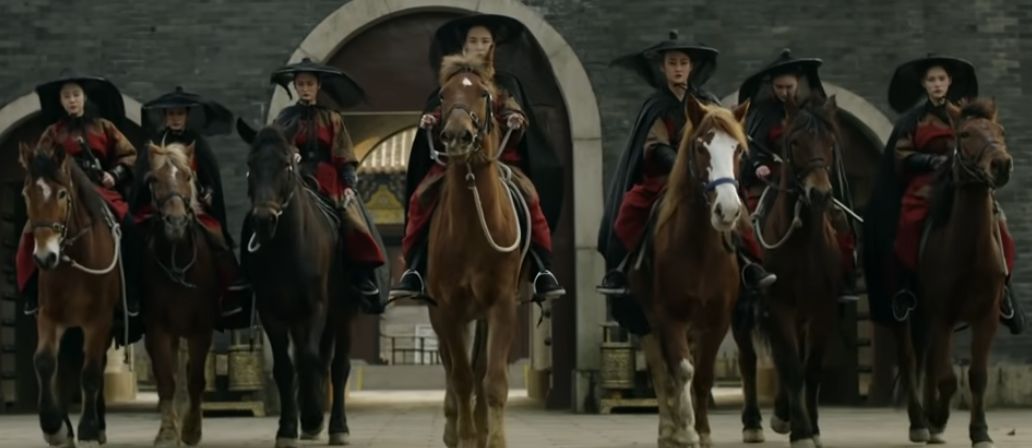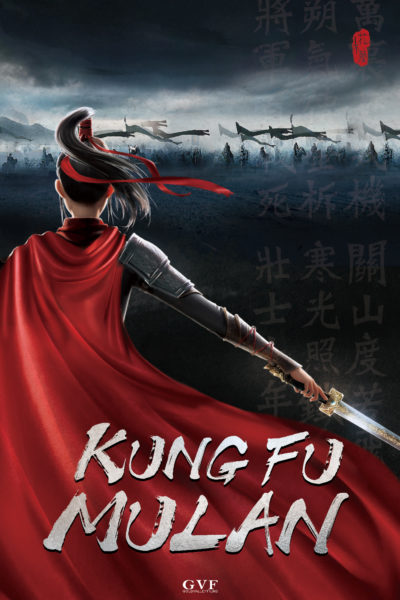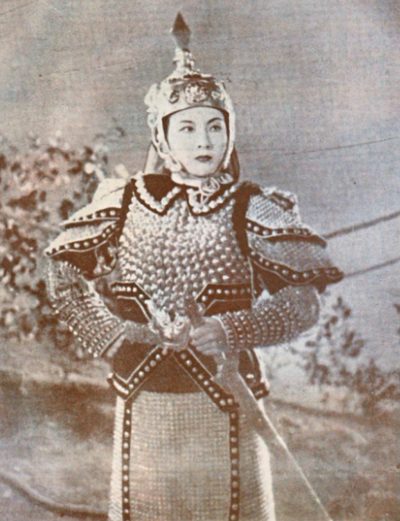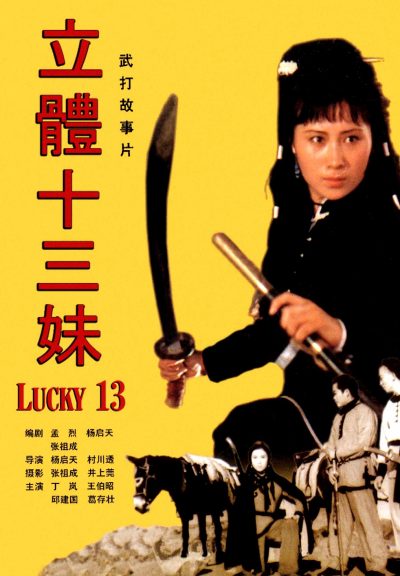★★★
“Ariel assault?”
 This feel like it could easily have come out of the nineties, with the distinct whiff of a throwback to the golden age of Hong Kong “girls with guns” movies. That is, of course, not a bad thing. However, this is not really golden. It’s probably not even bronzey. High-quality PVC perhaps? I think the main difference is probably that the classics starred the likes of Moon Lee, Cynthia Khan and Yukari Oshima, who could kick ass in a convincing fashion. The actresses here are largely limited to gun-play, and most of them look like they would be soundly defeated by a stiff oncoming breeze. However, I can’t knock the production values here: this is slick, well-made and looks very nice.
This feel like it could easily have come out of the nineties, with the distinct whiff of a throwback to the golden age of Hong Kong “girls with guns” movies. That is, of course, not a bad thing. However, this is not really golden. It’s probably not even bronzey. High-quality PVC perhaps? I think the main difference is probably that the classics starred the likes of Moon Lee, Cynthia Khan and Yukari Oshima, who could kick ass in a convincing fashion. The actresses here are largely limited to gun-play, and most of them look like they would be soundly defeated by a stiff oncoming breeze. However, I can’t knock the production values here: this is slick, well-made and looks very nice.
The group of the title consists of six young women, under the leadership of Yang Yi/Moman (Xu) – the subtitles say one thing, the credits another – who go after drug dealers and related bad guys. It’s the usual group of individuals, each with their own special skills. For instance, Qi Xia (Zhou) appears to be the smart girl of the group. Well, she wears glasses and sucks a lollipop, anyway: her intelligence never has much relevance. Similarly, Sha Lv, which I have no idea how to pronounce, is the team’s sniper, and so on. None of them make much of an impression, save for Moman, who is also the one lucky enough to receive a dramatic arc, since her sister was killed during the escape of a captured villain. Or was she?
This runs barely an hour long in the version officially released on YouTube, – maybe there’s a director’s cut somewhere? There did definitely seems to be edits. It’s not so much slim as positively anorexic, with not much room for development of story or characters. Moman and her team work their way up the chain, with some light action, though there is a surprising amount of death on the way. Let’s just say, Mermaid Team will be placing a ‘Help wanted’ advert. I did like Zhu, who plays Mi Lai, a henchwoman to one of the bad guys, and has an appropriately wild-cannon vibe to her. I was hoping for a final battle between Mi Lai and Moman; however, this seems almost totally disinterested in hand-to-hand action.
Not that it’s by any means bad, just competently forgettable, with a lack of many memorable elements – in either good or bad direction. I don’t know what the budget was on this. I suspect, like many Chinese films, it was relatively small by Hollywood standards, yet Ma certainly does a good job of squeezing every ounce of production value out of the price, and the images pop off the screen too. I must confess though, given the title, I was expecting at least some aquatic shenanigans, but these mermaids remain resolutely land-dwelling. On the other hand, while Googling the title, I did learn there is apparently a World Mermaid Championship. Never say this site is not informative…
Dir: Ma Hong-Wen
Star: Xu Zi-Lu, Zhang Da-Ke, Zhou Jing, Zhu Jue





 ★★½
★★½ To my surprise, when I begin researching this film, it appears actually to be based – at least, somewhat – in reality. I give you
To my surprise, when I begin researching this film, it appears actually to be based – at least, somewhat – in reality. I give you  This takes place in early 15th century China, when Zhu Di (Zhang) had taken over the throne from his nephew, Wen Du (also played by Zhang), forcing the latter to go into hiding. Zhu is protected by his all-female Imperial Guard, under the leadership of Qing Lian (Xu). Actually, all seven of them have the surname Qing, which confused the heck out of me at first. But it actually makes sense, as they were taken in as babies, and brought up for the express purpose of protecting Zhu Di. Anyway, he gets word that Wen is to be found in a house of ill-repute, and send the Qings after him. Lian is injured in the raid, but her life is saved by Li Gexiao. When she returns to Zhu, however, he’s having none of it and orders her to kill Li, knowing he is actually the dethroned Emperor Wen. Lian opts not to carry out the emperor’s orders, and so the remaining Imperial Guard sisters are sent out by Zhu, to make her pay for her disloyalty.
This takes place in early 15th century China, when Zhu Di (Zhang) had taken over the throne from his nephew, Wen Du (also played by Zhang), forcing the latter to go into hiding. Zhu is protected by his all-female Imperial Guard, under the leadership of Qing Lian (Xu). Actually, all seven of them have the surname Qing, which confused the heck out of me at first. But it actually makes sense, as they were taken in as babies, and brought up for the express purpose of protecting Zhu Di. Anyway, he gets word that Wen is to be found in a house of ill-repute, and send the Qings after him. Lian is injured in the raid, but her life is saved by Li Gexiao. When she returns to Zhu, however, he’s having none of it and orders her to kill Li, knowing he is actually the dethroned Emperor Wen. Lian opts not to carry out the emperor’s orders, and so the remaining Imperial Guard sisters are sent out by Zhu, to make her pay for her disloyalty. Over in my non-GWG life, I’ve been on
Over in my non-GWG life, I’ve been on  Going into this, I was expecting it to be really terrible. After all, this Chinese animated version seemed to be little more than a mockbuster, riding on the trails of Disney’s
Going into this, I was expecting it to be really terrible. After all, this Chinese animated version seemed to be little more than a mockbuster, riding on the trails of Disney’s  Yang Yang (Yang) is an impetuous young policewoman, whose career is on thin ice after shooting the target of what was supposed to be a surveillance operation. Her superior officer – who also happens to be her uncle – is forced to re-assign her, and sends Yang to operate undercover as a student in a high school from which girls have been going missing. The leading suspect is an arrogant pupil who has recently been accused of sexually assaulting a classmate. Teacher Wu Xie (Zhou) is a witness in the case, so Yang is also tasked with making sure he isn’t pressured into changing his statement. Fitting in is going to be part of the problem for Yang – despite the help of Molly (Li), who takes the “new girl” under her wing.
Yang Yang (Yang) is an impetuous young policewoman, whose career is on thin ice after shooting the target of what was supposed to be a surveillance operation. Her superior officer – who also happens to be her uncle – is forced to re-assign her, and sends Yang to operate undercover as a student in a high school from which girls have been going missing. The leading suspect is an arrogant pupil who has recently been accused of sexually assaulting a classmate. Teacher Wu Xie (Zhou) is a witness in the case, so Yang is also tasked with making sure he isn’t pressured into changing his statement. Fitting in is going to be part of the problem for Yang – despite the help of Molly (Li), who takes the “new girl” under her wing. I suppose this could be claimed to be a “mockbuster”, not so different from the sound-alike films released by The Asylum, e.g. Snakes on a Train. There’s no doubt this was made to ride the coat-tails of its far larger and better advertised big sister. And it’s not alone, with at least two other Chinese films apparently in production, one animated and the
I suppose this could be claimed to be a “mockbuster”, not so different from the sound-alike films released by The Asylum, e.g. Snakes on a Train. There’s no doubt this was made to ride the coat-tails of its far larger and better advertised big sister. And it’s not alone, with at least two other Chinese films apparently in production, one animated and the  Y’know, considering this is now more than eighty years old, this was likely better than I expected. Chen makes for a solid and engaging heroine, right from the start, when she tricks the residents of a nearby village, who demand she hand over the proceeds of her hunting [I am hoping the dead bird which plummets to the ground with an arrow through it, less than three minutes in, was a stunt avian…]
Y’know, considering this is now more than eighty years old, this was likely better than I expected. Chen makes for a solid and engaging heroine, right from the start, when she tricks the residents of a nearby village, who demand she hand over the proceeds of her hunting [I am hoping the dead bird which plummets to the ground with an arrow through it, less than three minutes in, was a stunt avian…] Despite a mangled title, what you have here is a straightforward tale of vengeance – and its attempts to diverge from that narrative are when the film is at its least interesting. Evil general Ji Xian Tang kills the parents of Ho Yu Fung (Ding): well, I suppose technically he only kills her father, her mother committing suicide by the corpse. In some remarkably unsubtle foreshadowing, Yu Fung is told, “This broadsword is our family heirloom. Our hope for vengeance is in your hands.” Given this, it’s no surprise she escapes with the help of a brave sacrifice from a servant, and becomes the pupil of a kung-fu master.
Despite a mangled title, what you have here is a straightforward tale of vengeance – and its attempts to diverge from that narrative are when the film is at its least interesting. Evil general Ji Xian Tang kills the parents of Ho Yu Fung (Ding): well, I suppose technically he only kills her father, her mother committing suicide by the corpse. In some remarkably unsubtle foreshadowing, Yu Fung is told, “This broadsword is our family heirloom. Our hope for vengeance is in your hands.” Given this, it’s no surprise she escapes with the help of a brave sacrifice from a servant, and becomes the pupil of a kung-fu master.